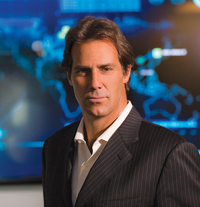The rock star of cybersecurity

When Dave DeWalt, EG86, arrived in Silicon Valley in the fall of 1986, he found himself in the middle of a revolution.
All around him, the high-tech renaissance of the late 20th century was beginning to stir, but for the 22-year-old UD grad, the sunny California landscape seemed like a foreign land. He had no friends. No money. No clear plan and no place to stay, besides a cramped room at the Villa Hotel. What he did have was a new suit from Boscov’s, a freshly minted degree—and a vision of what it would take to succeed.
Part of that vision came from his mom and dad—among all that they gave Dave during his young years in Reading, Pa., Robert and Armella DeWalt were careful to instill a deep-seated conviction that success requires sacrifice, that a man must work to be worthy of the honors that others bestow. Another part of it came from his days on the University of Delaware campus—where, as an All-American wrestler, he learned something that went beyond the piles of textbooks that remain daily companions to a computer science and electrical engineering major.
“Hard work and humility—keeping your feet on the ground and outworking everybody else. That’s what I learned at Delaware,” says DeWalt, now 51 and arguably one of the most prominent voices in the Silicon Valley world he once regarded with such awe and uncertainty.
DeWalt rose to the top job at McAfee security at age 43. This year, he was named to Vanity Fair’s “New Establishment List” of movers-and-shakers. As Chairman and CEO of the FireEye cybersecurity firm, he has developed his company into one of the world’s pre-eminent authorities on investigating—and preventing—the massive data breaches that have hit high-profile corporations in recent years.
Under DeWalt’s watch, FireEye, and its Mandiant forensics team, have served as sleuths-for-hire in several high-profile cybercrimes: In recent years, it has cleaned up large data breaches at health insurer Anthem and Pennsylvania State University. In 2013, its warnings to mega-retailer Target about security risks went unheeded, leading to 40 million card numbers being compromised. Every day, in nations around the globe, FireEye’s network of millions of “virtual machines” guard against hackers targeting firms such as Visa, General Electric, Facebook and even the National Security Agency—“tasting” incoming data like a king’s poison-tester, and stopping the attacks before they can do harm.
But it was a 2014 case that probably solidified FireEye, Mandiant (and DeWalt) as bona fide rock stars of cybersecurity. Sony Pictures was about to release a film that portrayed North Korea’s leader in a less-than-flattering light, when suddenly a few malicious bits of code found their way into Sony’s computer servers. Not satisfied with routine theft of Sony’s property—business secrets, unreleased movies, personnel records—the hackers also destroyed more than 3,000 computers and 800 servers without ever setting foot in the buildings.
FireEye was hired to work the case and improve security, but also found itself swept up in a rising awareness of all that was at stake for our nation. Instantly, malicious hacking was something that wasn’t just a threat to individual Americans’ bank accounts, or some mega-corporation’s reputation. It was becoming frighteningly clear that hacking could easily imperil national security, and that a new weapon of electronic mass destruction was among us—maybe for good.
It’s plain that DeWalt believes that being part of the fight against this threat is more than “just business.” Ultimately, this is a matter of our society’s future, and maybe even, someday, wars to be fought.
“What we’re experiencing today is [an era when] mankind has discovered a new domain, and if you look at the history of mankind discovering new domains, it’s never had a good outcome. We are entering a very interesting, challenging era where this domain is beginning to be fought over and there are few rules of engagement. An almost perfect storm is occurring,” he says, noting with dismay that every few months brings the appearance of another nation displaying aspirations of cyber-aggression. “The smallest nations can be powerful players in this game. And as a matter of fact, the largest nations can be the most vulnerable players in this game. So we’re seeing skirmishes all the time.”
The United States and the world are faced with a new reality, and to be successful, new approaches are needed, DeWalt believes. In the still-gestating existence of cybersecurity strategies, the world simply hasn’t yet matured enough to have such necessary tools as governing bodies and unified sanctions. “But we will evolve to that,” DeWalt warns. “Part of my vision is, how do we create agencies that are global? It’s going to take more than one nation to solve it. Nationalism could do more harm than good.”
Here is where the former wrestling champ, with his fighter’s philosophy of prevailing over challenges, emerges—albeit with humble altruistic idealism. As he told the thousands of UD grads at the spring commencement address this May, the key to success lies in what he calls “the 3H’s”—hard work, humility and honesty.
In Dave DeWalt’s engineering-molded mind, there is a moral calculus to observe: He knows that all the money adds up to little if it cancels out the values that got him here—humility, transparency and honesty, as well as honesty’s more-refined sibling: honor. True success for him is defined these days by how much he and his company are helping—to keep the world a safer place, and to keep the flames of war from igniting once again.
And, as DeWalt has learned time and again, it will require a good dose of courage. “You can’t live in fear,” he says. “You have to embrace it and change it.”
Article by Eric Ruth, AS93


